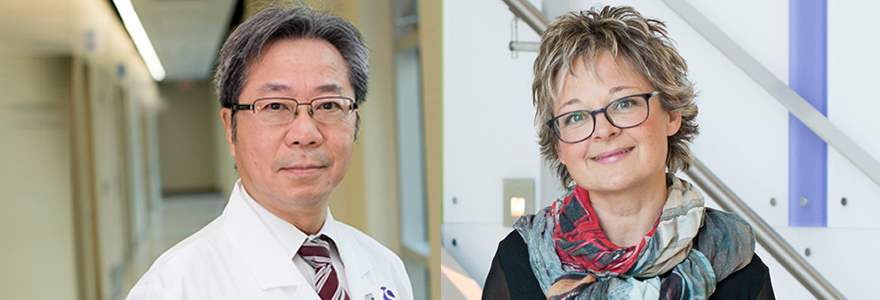Feature: Researchers assessing risks of surgery during COVID-19 pandemic

By Crystal Mackay
When it comes to global access to safe surgery during a viral outbreak like COVID-19, Schulich Medicine & Dentistry researchers Dr. Davy Cheng and Associate Professor Janet Martin are stressing the importance of basing recommendations and guidelines on evidence. They are working to define the unexpected risks of infection and spread to health care workers and other patients during the perioperative period which includes admission, anesthesia, surgery, and recovery.
“We need to understand the much-increased risk of COVID-19 spread in the perioperative period and in the hospitals, so we can improve protection for our health care workers,” said Dr. Cheng, who is the current Acting Dean at Schulich Medicine & Dentistry. “This is a crucial time for such evidence and there is urgency in getting the evidence to the frontline and our perioperative surgical teams.”
The work is being done through the Centre for Medical Evidence, Decision Integrity & Clinical Impact (MEDICI) at Schulich Medicine & Dentistry, which was designated in 2016 as a WHO Collaborating Centre to study global surgery, anesthesia and perioperative care. The team at MEDICI is building off of work they started in 2014 focused on the Ebola outbreak in West Africa together with West African surgical teams and the WHO.
“We were invited by the WHO to evaluate the impact of viral outbreaks on surgery, anesthesia and perioperative care,” said Martin, Director of the MEDICI Centre. “No one had looked at this systematically before, so we were brought in to evaluate whether or not viral epidemics pose an extra risk during surgery.”
Their work soon extended to other viral diseases including MERS and SARS caused by coronaviruses similar to COVID-19. Since January, they have compiled data on hundreds of surgical case reports throughout the early stages of the COVID-19 pandemic to track the outcomes of surgery both to the patients who have unexpected, suspected or confirmed cases and the health care teams. The main purpose is to inform local and global guidelines on proper procedures and protective equipment needed to keep the surgical team and patients safe if surgery is moving ahead.
They are expecting to have published results on this data by the end of April.
The MEDICI Centre has also been consulted by the World Federation of Societies of Anesthesiologists (WFSA) on COVID-19 guidance for anaesthesia and perioperative care providers.
"For COVID-19, we’re focused on the risk to patients and the health care teams during surgery,” said Dr. Cheng. “It is important during this pandemic that we continue to emphasize the importance of research evidence to inform the course of diagnoses and treatment for patients, and protections for staff.”
The team at MEDICI is also currently working together with major medical centers in Wuhan, China, the epicentre of the original outbreak, to evaluate risk factors that influence mortality in patients with COVID-19.
The MEDICI team is also collaborating with the GlobalSurg Collaborative on the CovidSurg Study to assess whether performing surgery during a pandemic might pose extra risk to the patients. The CovidSurg Study, coordinated by the NIHR Global Health Research Unit on Global Surgery at the University of Birmingham, is an innovative and globally-collaborative approach to research designed to provide timely answers, iteratively updated throughout the pandemic. So far CovidSurg has surgeons and anesthesiologists participating from Canada, China, Germany, Hong Kong, Italy, Korea, Singapore, Spain, United Kingdom and the United States.
“In the spirit of MEDICI, our main aim is to ensure that our recommendations in medicine and health care are based on best possible evidence,” said Martin. “Research that is systematic and valid means that we find answers that we can stand behind with confidence. We are facing a life and death issue right now, and that makes this kind of research more urgent than ever.”








